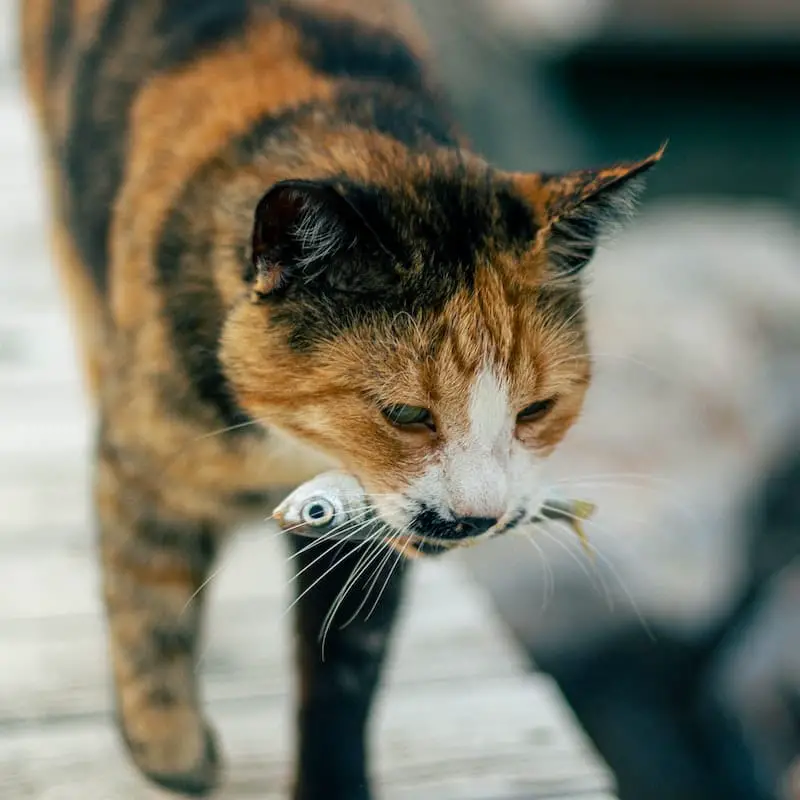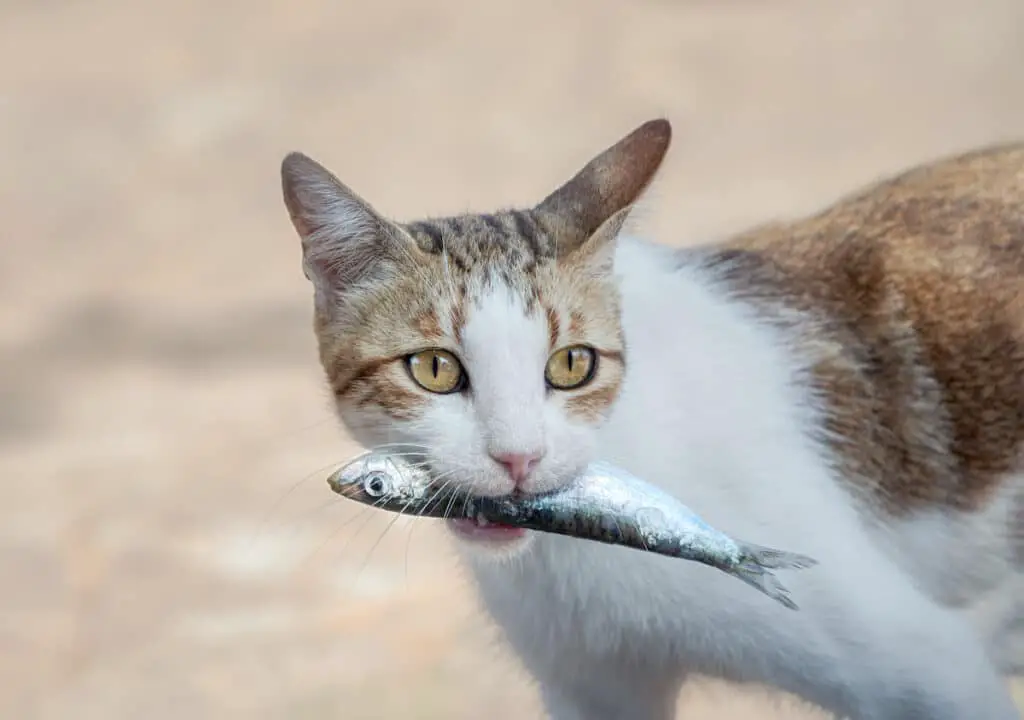Cats are carnivores, meaning they are designed to eat a diet full of meat. However, this does not necessarily mean that cats should only eat meat. In fact, cats can enjoy a variety of proteins and carbohydrates, including fish. So the simple answer to the question “do cats eat fish?” is yes. But what kind of fish should cats eat, and how much of it should they eat?
Types of Fish That Are Safe for Cats
When it comes to feeding your cat fish, it is important to choose the right type of fish. Some fish that can be safely given to cats in moderation include:
- tuna
- salmon
- sardines
- whitefish
It is also important to note that these types of fish should only be given to cats in canned or cooked form. Raw fish can contain parasites that can be harmful to cats, so it is best to avoid feeding them raw fish.
Parasites in Raw Fish
Raw fish can be a great source of protein for cats, but unfortunately, it can also carry parasites that can easily make your cat sick. Some of the most common parasites found in raw fish are tapeworms, flukes, and roundworms. Tapeworms can live in the intestines of cats and cause them to lose weight and have an overall decrease in health. Flukes are flatworms that can cause skin irritation and can even lead to liver damage. Roundworms can be found in the intestines of cats and can cause digestive issues, vomiting, and diarrhea.
How Much Fish Should Cats Eat?
Cats need a balanced diet that includes a variety of proteins, including fish. But how much fish should cats eat? The answer depends on the age and size of your cat as well as the type of fish you are feeding.
Kittens should be fed a diet that is high in protein, including at least 10% fish. As your cat grows and matures, the amount of fish in their diet should be reduced to no more than 5%. This is because cats need a variety of proteins to stay healthy.
It is best to feed your cat fresh or frozen fish that has been cooked without added oils, salts or spices. Avoid feeding your cat canned fish as it is often high in sodium and other preservatives.
When selecting fish for your cat, look for species that are low in mercury, such as cod, haddock, and tilapia. Avoid feeding your cat tuna, swordfish, and other large predatory fish, as these can be high in mercury and other toxins.
The amount of fish you feed your cat should also be based on their size and activity level. For example, a larger, active cat may need more fish than a small, sedentary cat.

Is Fish a Healthy Choice for Cats?
For cats, fish can be a great source of healthy nutrition. Fish is high in protein, and it can provide essential fatty acids and key vitamins and minerals. Fish can also be a great source of omega-3 fatty acids, which are beneficial for cats in terms of healthy skin and coat, joint health, and more.
However, it is important to note that not all fish are created equal. Some types of fish can contain high levels of mercury or other contaminants, so it is important to do your research and make sure your cat is getting a safe and healthy fish. Additionally, raw fish can also be dangerous for cats, as it may contain harmful bacteria.
What Are the Risks of Feeding Cats Too Much Fish?
The risks of feeding cats too much fish can be severe. Fish can be a nutritious part of a balanced diet for cats, but overfeeding fish can cause serious health risks. Excessive consumption of fish can cause a buildup of thiaminase in a cat’s body, which can lead to a thiamine deficiency. This deficiency can cause a variety of health problems, including neurological issues, digestive problems, and heart disease.
In addition, too much fish can cause a cat to gain weight, which can put them at risk for obesity-related health problems. Overfeeding fish can also put cats at risk for developing mercury poisoning, as some types of fish may contain high levels of mercury. This can cause serious health complications, such as kidney and neurological damage.
Finally, cats that are fed too much fish can become picky eaters, refusing to eat any other type of food. This puts them at risk for nutritional deficiencies, as they are missing out on important nutrients that can be found in other types of food.
Types of fish you should not give to cats
While cats can benefit from a healthy fish diet, there are some types of fish that should be avoided.
- Saltwater Fish: Saltwater fish can contain high levels of mercury, which can be toxic to cats.
- Raw Fish: Raw fish can contain bacteria and parasites that can be harmful to cats.
- Tilapia: Tilapia can contain high levels of toxins that can be dangerous to cats.
- Silver Fish: Silverfish contain high levels of thiaminase, which can lead to thiamine deficiency in cats.
- Sturgeon: Sturgeon contain high levels of toxins that can be dangerous to cats.
Therefore, it is important to only feed your cat fish that is safe. Be sure to consult your vet before feeding your cat any type of fish.
FAQs: Do Cats Eat Fish?
Generally speaking, cats are obligate carnivores, meaning they need to eat animal proteins to survive. Fish can be a great source of protein for cats, but it isn’t necessarily their favorite food. In fact, a study of wild cats found that, while fish may be an important part of their diet, it is not the most important part.
However, domestic cats may be more likely to like fish. This is partly due to the fact that cats in captivity are often exposed to fish-based foods, such as canned tuna or salmon, or even sardines. Cats may learn to associate fish with a particularly tasty meal, and that may cause them to develop a preference for fish-based foods.
Fish is one of the most important sources of nutrition for cats. It’s packed with important vitamins and minerals, such as omega-3 fatty acids, protein, and taurine, which are all essential for a healthy and balanced diet. Fish is also a great source of flavor, which cats find irresistible. Cats have a natural instinct to hunt and eat fish, so it’s no surprise that they love it. Eating fish can also provide cats with a sense of satisfaction and comfort, which makes it even more appealing. Plus, thanks to its high water content, a fish-based diet can help keep cats hydrated. All in all, fish is an excellent source of nutrition for cats and can provide them with the energy and nutrients they need to stay healthy and happy.
Generally speaking, cats are carnivores and prefer to eat meat. This is because it is high in protein, which is essential for their growth and development. Meat is also an excellent source of other important nutrients, such as vitamins and minerals.
However, cats can also be attracted to the smell and taste of fish. It’s an excellent source of omega-3 fatty acids, which can help to promote healthy skin and coat. Fish is also rich in other essential nutrients, such as B vitamins and selenium.














